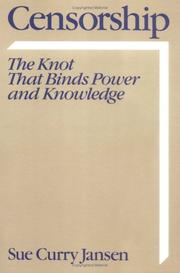| Listing 1 - 10 of 1017 | << page >> |
Sort by
|
Book
Abstract | Keywords | Export | Availability | Bookmark
 Loading...
Loading...Choose an application
- Reference Manager
- EndNote
- RefWorks (Direct export to RefWorks)
The influence of censorship on the intellectual and political life in the Habsburg Monarchy during the period under scrutiny can hardly be overstated. This study examines the institutional foundations, operating principles, and results of the censorial activity through analysis of the prohibition lists and examination of the censors themselves. The effects of censorship on the authors, publishers, and booksellers of the time are illustrated with the help of contemporary documents. Numerous case studies focus on individual works forbidden by the censors: Romanticists like Ludwig Tieck and E. T. A. Hoffmann and even authors of classic German literature like Wieland, Goethe, and Schiller saw their works slashed, as did writers of popular French and English novels and plays. An annex documents the most important regulations along with a selection of censorial reports.
Book
ISBN: 9004418822 Year: 2020 Publisher: Leiden, The Netherlands ; Boston : Brill Sense,
Abstract | Keywords | Export | Availability | Bookmark
 Loading...
Loading...Choose an application
- Reference Manager
- EndNote
- RefWorks (Direct export to RefWorks)
Scientists and Poets #Resist is a collection of creative nonfiction, personal narrative, and poetry. This volume is a conversation between poets and scientists and a dialogue between art and science. The authors are poets, scientists, and poet-scientists who use the seven words—"vulnerable," "entitlement," "diversity," "transgender," "fetus," "evidence-based" and "science-based"—banned by the Trump administration in official Health and Human Service documents in December 2017 in their contributions. The contributors use the seven words to discuss their work, reactions to their work, and the creative environment in which they work. The resulting collection is an act of resistance, a political commentary, a conversation between scientists and poets, and a dialogue of collective voices using banned words as a rallying cry— Scientists and Poets #Resist —a warning that censorship is an issue connecting us all, an issue requiring a collective aesthetic response. This book can be read for pleasure, is a great choice for book clubs, and can be used as a springboard for reflection and discussion in a range of courses in the social sciences, education, and creative writing.
Book
Year: 1658 Publisher: London : Printed by Ric. Hodgkinsonne,
Abstract | Keywords | Export | Availability | Bookmark
 Loading...
Loading...Choose an application
- Reference Manager
- EndNote
- RefWorks (Direct export to RefWorks)
eebo-0014

ISBN: 0195069064 Year: 1991 Publisher: London Oxford university
Abstract | Keywords | Export | Availability | Bookmark
 Loading...
Loading...Choose an application
- Reference Manager
- EndNote
- RefWorks (Direct export to RefWorks)
Book
ISBN: 3874270319 Year: 1987 Publisher: Köln Kölner Universitätsverlag
Abstract | Keywords | Export | Availability | Bookmark
 Loading...
Loading...Choose an application
- Reference Manager
- EndNote
- RefWorks (Direct export to RefWorks)
Book
Year: 2009 Publisher: Firenze, Italy : Firenze University Press,
Abstract | Keywords | Export | Availability | Bookmark
 Loading...
Loading...Choose an application
- Reference Manager
- EndNote
- RefWorks (Direct export to RefWorks)
La società sovietica è sempre stata caratterizzata da un forte istituto censorio che di fronte al potere della parola scritta ha messo in opera una serie di istituzioni altamente repressive. Ma la censura non necessariamente esercita il suo potere attraverso forme coercitive; ci sono modalità di intervento che si espletano attraverso una complessa rete di istituzioni culturali, in grado di "produrre" la società, espungendo pensieri ed atteggiamenti pericolosi per il sistema ed organizzando al contempo una serie di organismi destinati a forgiare comportamenti e mentalità ortodossi, tanto da rendere spesso quasi inutile la funzione del censore esterno, sostituito dal "censore dell'anima". Il libro qui presentato cerca di evidenziare questo secondo aspetto della censura, senza tuttavia trascurare la grande macchina repressiva messa in atto dal potere sovietico.
Book
Year: 1658 Publisher: London, : Printed by Ric. Hodgkinsonne,
Abstract | Keywords | Export | Availability | Bookmark
 Loading...
Loading...Choose an application
- Reference Manager
- EndNote
- RefWorks (Direct export to RefWorks)
eebo-0018
Book
Year: 1658 Publisher: London : Printed by R. Hodgkinsonne, and are to be sold by Tho. Vere ...,
Abstract | Keywords | Export | Availability | Bookmark
 Loading...
Loading...Choose an application
- Reference Manager
- EndNote
- RefWorks (Direct export to RefWorks)
eebo-0113
Book
ISBN: 8864530800 Year: 2009 Volume: 10 Publisher: Firenze : Firenze University Press,
Abstract | Keywords | Export | Availability | Bookmark
 Loading...
Loading...Choose an application
- Reference Manager
- EndNote
- RefWorks (Direct export to RefWorks)
Soviet society has always been characterised by a marked institutional censorship which, in the face of the power of the written word, has set in motion a series of highly repressive institutions. However, censorship does not necessarily exert its power through forms of coercion; there are also approaches that are implemented through a complex network of cultural institutions that can "produce" society, expunging concepts and attitudes that are a threat to the system and at the same time masterminding a series of organisms designed to forge orthodox behaviour and mindframes, to the extent that the role of the external censor often becomes almost superfluous, being replaced by the "censor of the soul". This book seeks to bring to the fore this second type of censorship, albeit without neglecting the complex repressive machinery set in motion by Soviet power. Press Review: Il Giornale, L'INTERVISTA - MARIA ZALAMBANI: «Così Breznev censurò persino Sartre» a cura di Giuseppe Ghini, 19/04/2010.
Book
ISBN: 9004655336 Year: 1987 Publisher: Amsterdam : BRILL,
Abstract | Keywords | Export | Availability | Bookmark
 Loading...
Loading...Choose an application
- Reference Manager
- EndNote
- RefWorks (Direct export to RefWorks)
| Listing 1 - 10 of 1017 | << page >> |
Sort by
|

 Search
Search Feedback
Feedback About UniCat
About UniCat  Help
Help News
News